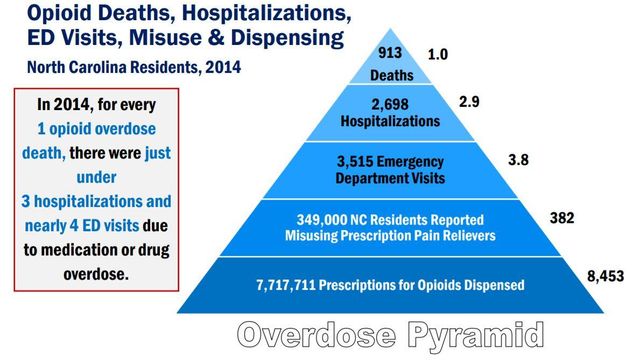Three deaths a day: NC grapples with opioid crisis
Since roughly half of the people who turn up in emergency rooms with an opioid problem don't have insurance, there's little incentive for the private sector to stand up treatment programs where they're needed most.
Posted — UpdatedAnd, although this is a statewide issue, the worst problems are often clustered in rural areas – the very areas with few long-term treatment options for addicts.
Since roughly half of the people who turn up in emergency rooms with an opioid problem don't have insurance, there's little incentive for the private sector to place treatment programs where they're needed most, Dr. Susan Kansagra told a legislative oversight committee.
"It's a little bit of chicken or the egg," said Kansagra, DHHS' point-person on the state's opioid crisis.
Kansagra said 8,000 opioid users have been saved statewide by naloxone, a drug that reverses overdoses. DHHS recently bought 40,000 doses of naloxone to distribute to counties.
Sen. Ralph Hise, R-Mitchell, questioned whether naloxone is making the opioid problem worse.
"What we're actually seeing in the data is that deaths are increasing at a rate maybe even faster than they were prior to this drug being available," Hise said.
Kansagra said the death toll is rising in spite of naloxone, not because of it.
"Overdose rates are rising because we're seeing more particularly illicit drugs coming into our state," she said. "Had we not had the naloxone, I fear that our numbers would have been much worse."
Rep. Greg Murphy, R-Pitt, a Greenville physician, said that, even after someone is revived with naloxone, they're not required to receive further treatment, and no substance abuse treatment programs are even available in many rural counties.
"Unless we get those folks into treatment, we're not doing anything. We're just continuing to spin our wheels, and that's one of our biggest challenges for our state," Murphy said.
Kansagra and her colleagues never said the words "Medicaid expansion" in presenting Tuesday to legislators, many of whom represent the Republican majority in Raleigh that has declined for several years a vast extension of the federally subsidized health insurance program in North Carolinas. But she and DHHS Secretary Dr. Mandy Cohen repeatedly told General Assembly members looking for answers in the opioid crisis that access to insurance is crucial.
GOP legislators have resisted expansion at least in partly over cost concerns. House Appropriations Chairman Nelson Dollar who was in Tuesday's oversight committee meeting, said there's too much uncertainty surrounding federal health care policy, and the future of expansion funding, to expand the program in North Carolina and potentially put the state budget on the hook for hundreds of millions in new funding.
Dollar, R-Wake, also said he'd like to hear in a future meeting from the local organizations that the state funds to deal with mental health and addiction issues. He described Tuesday's presentation as a 40,000-foot view.
"I think you need to hear maybe a little fuller picture about where we are in terms of treatment on the ground, where those folks are seeing the gaps, where we're having successes, what's working, what's not working," Dollar said. "I think that would actually give you a little bit better picture of what's going on at the grassroots level."
The upshot of Tuesday's report was that North Carolina is making some progress stemming the tide of opioid overdoses but has much more work to be done. So much so that DHHS officials believe they'll soon be reporting an average of four overdose deaths a day, instead of three, Cohen said.
That's largely due to a massive spike in overdoses from heroin and synthetic narcotics, as opposed to opioids prescribed by doctors for pain. Overdoses from prescribed pills have actually decreased slightly in recent years. Dollar said that points to some success for laws the General Assembly has changed in recent years.
Related Topics
• Credits
Copyright 2024 by Capitol Broadcasting Company. All rights reserved. This material may not be published, broadcast, rewritten or redistributed.





